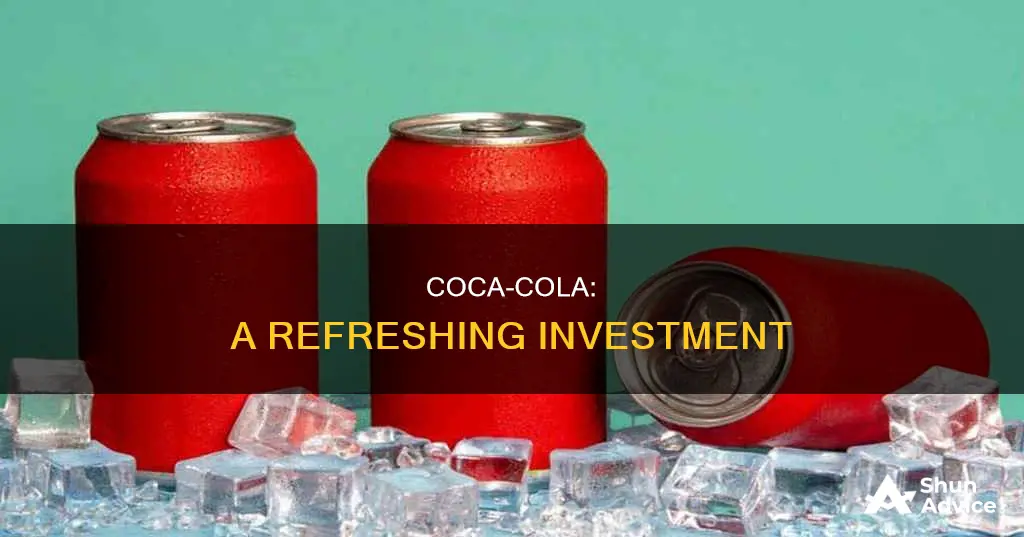
Coca-Cola is a well-known global brand and one of the world's top beverage makers. The company has over 500 brands and a vast global presence, delivering its products to almost every corner of the world. It has a strong market leadership position with an 8.4% global market share. Coca-Cola has a solid cash flow and a superior balance sheet in terms of cash and debt, giving it better protection during challenging economic times. The company has been adapting its products to changing consumer preferences and has diversified its offerings to include drinks such as sparkling beverages, performance drinks, juices, and plant-based drinks, and even coffee. With its reliable track record, consistent dividend growth, and steady sales, Coca-Cola is considered a relatively safe and reliable investment option, particularly for conservative investors.
What You'll Learn
- A well-known, global brand with a diverse portfolio of over 500 brands
- A reliable, recession-proof business with a history of steady sales
- A strong balance sheet with a large cash stash and modest debt
- A large global presence with opportunities for market expansion
- A long-term dividend king with a history of increasing shareholder returns

A well-known, global brand with a diverse portfolio of over 500 brands
Coca-Cola is a well-known global brand with a diverse portfolio of over 500 brands, including water and hydration products, coffee and teas, juices, dairy, plant-based beverages, and energy drinks. The company's global presence and brand recognition are key factors in its success and market dominance. With a market share of 8.4%, Coca-Cola has a vast economic authority that allows it to set prices and purchase supplies at a lower cost than its competitors. This global reach also provides Coca-Cola with a diverse customer base and the ability to adapt to changing consumer preferences.
The company's diverse portfolio of beverages caters to a wide range of consumer tastes and needs. In addition to its iconic Coca-Cola product, the company offers a range of soda products such as Sprite and Fanta. It also sells lemonade under the Minute Maid brand, tea under the Honest Tea brand, milk from Fairlife, and water from Dasani. This broad portfolio allows Coca-Cola to remain resilient and adaptable, ensuring that it can continue to generate significant revenue and profit even as consumer preferences shift.
Coca-Cola's global brand recognition is a significant competitive advantage. The company's enormous brand strength, with Interbrand ranking it as the world's fifth most valuable brand worth $66.3 billion, gives it a powerful position in the market. The company's strong marketing capabilities further enhance its brand power, with Coca-Cola spending $10.3 billion on selling, general, and administrative expenses in 2018. This combination of brand recognition and marketing expertise has helped Coca-Cola establish itself as a household name in numerous countries.
The company's global expansion has been a key strategy for growth, with a presence in over 200 countries and territories worldwide. This expansion has allowed Coca-Cola to tap into new markets and increase its customer base. For example, in 2012, Mexico had the highest consumption of Coca-Cola products, with 745 servings consumed per person, while the United States consumed 401 servings. There is still potential for further expansion, particularly in underpenetrated markets such as India, Indonesia, and China.
In addition to its global presence, Coca-Cola's diverse portfolio also contributes to its resilience and ability to adapt to changing consumer trends. The company has been proactive in diversifying its offerings and innovating new products to meet the growing demand for healthier options. As of 2019, 45% of its beverage portfolio is low-sugar or no-sugar, and many of its top brands offer variants with these options. This focus on health and wellness, along with its strong brand and marketing capabilities, has helped Coca-Cola maintain its market leadership position.
Trump Investors: Winners or Losers?
You may want to see also

A reliable, recession-proof business with a history of steady sales
Coca-Cola is a reliable, recession-proof business with a history of steady sales. The company has been around for 128 years and is a household name, with its products sold and distributed in over 200 countries and territories worldwide.
Coca-Cola's business model has proven resilient, even during economic downturns. For example, during the Great Recession from December 2007 to June 2009, the company's revenue rose by 11% year over year, and its operating income increased by 16%. While the stock price did take a hit during this period, the company's strong fundamentals and steady sales likely gave long-term investors confidence in its ability to rebound, which it did.
Coca-Cola's diverse product portfolio, which includes over 500 brands and 4,700 products, also contributes to its reliability. The company offers a wide range of beverages, including carbonated drinks, juices, dairy, plant-based beverages, energy drinks, and coffee. This diversity allows Coca-Cola to adapt to changing consumer preferences and thrive even as consumer tastes shift over time.
In addition, Coca-Cola has a strong balance sheet with a significant cash stash and manageable debt levels. This financial strength gives the company the flexibility to invest in product innovation, marketing, and expansion, as well as return value to shareholders through dividends.
The company has a long history of paying dividends, with 58 consecutive years of dividend increases. While the rate of dividend growth has slowed in recent years, Coca-Cola's dividends remain attractive, currently yielding over 3%.
Overall, Coca-Cola's reliable and stable business model, diverse product portfolio, strong financial position, and commitment to returning value to shareholders make it a compelling investment opportunity, particularly for conservative investors seeking long-term capital preservation and steady income.
Why Pay for Aaii Membership?
You may want to see also

A strong balance sheet with a large cash stash and modest debt
Coca-Cola's balance sheet is a strong indicator of its financial health. The company has a large cash stash, modest debt, and a solid cash flow.
As of its third-quarter 2022 filing, Coca-Cola's total stockholders' equity was $22.81 billion. This includes $1.76 billion of common stock at par value, $18.69 billion in capital surplus, and $70.89 billion in reinvested (retained) earnings, less $15.87 billion in accumulated other comprehensive income and treasury stock worth $52.67 billion.
In terms of debt, Coca-Cola's total liabilities were $68.04 billion, with $26.44 billion in current liabilities and $46.69 billion in long-term debt, deferred income taxes, and other long-term liabilities. The company's current ratio (current assets to current liabilities) was 1.12, and its debt-to-equity ratio was 2.78, indicating a healthy financial position.
Coca-Cola's large cash position is a significant strength. The company had $2.8 billion in cash following its second-quarter 2020 earnings, and its cash flow remains solid despite economic challenges. This strong cash position allows Coca-Cola to invest in its business, innovate, and adapt to changing consumer preferences.
The company's modest debt position is also advantageous. Coca-Cola's debt-to-equity ratio has been dropping, indicating effective management of its finances. The company's ability to service its debt is further enhanced by its solid cash flow, which ensures it can meet its debt obligations.
In summary, Coca-Cola's balance sheet highlights a company with a strong financial position. Its large cash stash and modest debt position provide stability and flexibility, enabling the company to navigate economic challenges and invest in growth opportunities. The company's solid cash flow further reinforces its financial health and ability to create long-term value for shareholders.
Home Improvement: Who's Spending the Most?
You may want to see also

A large global presence with opportunities for market expansion
Coca-Cola has a large global presence, with its products being sold in over 200 countries and territories worldwide. This extensive reach gives the company a significant economic advantage, allowing it to command pricing flexibility and secure lower costs for supplies compared to its competitors.
The company's global presence also presents opportunities for market expansion, particularly in regions like India, Indonesia, and China, which are considered underpenetrated in terms of servings. By leveraging its strong brand recognition and diverse product portfolio, Coca-Cola can continue to expand its market share and drive growth in these regions.
In addition to its global reach, Coca-Cola has demonstrated a commitment to innovation and diversifying its offerings. The company now has more than 500 brands, including water, hydration products, coffee, teas, juices, dairy, plant-based beverages, and energy drinks. This diversification strategy positions the company well to adapt to changing consumer preferences and tap into new markets.
Coca-Cola's global presence and expansion opportunities are further strengthened by its strong financial position. The company has a superior balance sheet with a significant cash stash, giving it the ability to invest in product innovation and market expansion. Additionally, its lower long-term debt compared to competitors means lower interest payments, resulting in higher cash flow and greater financial flexibility.
In summary, Coca-Cola's large global presence, combined with its financial stability and commitment to innovation, positions the company well for market expansion and continued success in the beverage industry. The company's diverse product portfolio and strong brand recognition will enable it to capture new markets and drive growth, making it an attractive investment opportunity.
Retirement Account: Investing Beyond $5500
You may want to see also

A long-term dividend king with a history of increasing shareholder returns
Coca-Cola is a Dividend King, a title reserved for stocks that have raised their dividends for at least 50 consecutive years. Coca-Cola has increased its dividend for 61 or 62 consecutive years, depending on the source. This is a remarkable feat, especially considering the challenging economic climates the company has endured during this time.
Coca-Cola's business model is almost recession-proof. During the Great Recession, which lasted from December 2007 to June 2009, the company's revenue rose by 11% year-over-year in 2008, and its operating income increased by 16%. In 2009, the company's revenue dropped by 3%, but this was due to the sale of certain bottling operations and currency fluctuations, rather than the weak economy.
Coca-Cola's strong brand and global scale give it distinct competitive advantages. Forbes ranks Coca-Cola as the sixth-most valuable brand in the world, worth $64.4 billion. The company has the largest beverage distribution system in the world, with about 2 billion of the 60 billion beverages consumed daily being Coca-Cola products. This unparalleled distribution network allows Coca-Cola to maintain high profitability, even during recessions.
Coca-Cola's consistent dividend increases, strong brand, and global scale make it an attractive investment option for conservative investors seeking long-term capital preservation and solid dividends.
Investments: The Thrill of the Hunt
You may want to see also
Frequently asked questions
Coca-Cola is a well-known global brand with a diverse portfolio of over 500 brands and a presence in over 200 countries and territories worldwide. The company has a strong financial position with a superior balance sheet and market leadership, making it a reliable investment with steady sales and consistent dividend growth.
Coca-Cola's business performed well during the Great Recession of 2007-2009, with revenue rising 11% year-over-year and operating income increasing 16%. While the stock price was impacted, the company's fundamentals remained intact, and long-term investors benefited from the rebound.
Coca-Cola has been adapting its products to meet the demand for healthier options, with 45% of its beverage portfolio being low-sugar or no-sugar options as of 2019. The company has also diversified its offerings beyond carbonated drinks, including water, tea, juices, dairy, plant-based beverages, and energy drinks.







